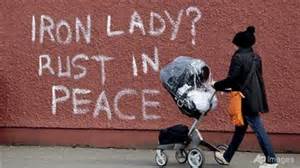This article on the ‘Bedroom Tax’ in Northern Ireland comes from eirigi. Several parallels (some erroneous and some useful) have been drawn between the ‘Bedroom Tax’ and the Poll Tax. However, even Thatcher’s Tory government never tried to introduce the Poll Tax into Northern Ireland in the context of the Republican struggle there. Today, the UK government feels more confident. This only re-emphasises a most important feature of the successful Anti-Poll Tax campaign – the necessity to organise on an ‘internationalism from below’ basis.
BEDROOM TAX A PUNITIVE ATTACK ON THE POOR

Next month, as Stormont starts to debate the Welfare Reform Bill, thousands of families in Housing Executive homes or renting from housing associations in the Six Counties face the bleak prospect of losing a substantial portion of their housing benefit if their home is deemed to be “under-occupied”, with only one bedroom allowed for each couple or individual over 16.
More than 32,000 households stand to be affected by this ‘bedroom tax’. Contrary to the impression being created by proponents of this scheme, the vast majority of the homes affected are “under-occupied” by just one bedroom.
The Six Counties already faces a growing housing crisis with almost 35,000 applicants on the social housing waiting list.
That figure does not give a full picture of the extent of the current housing crisis as the term ‘applicant’ does not indicate if those are single persons, couples or families. It is therefore conceivable that anywhere between 50,000 and 90,000 people – parents and children – could actually be on housing waiting lists.
Without any doubt, that housing crisis will be further exacerbated by the introduction of a ‘bedroom tax’ which will squeeze families on low incomes into greater hardship and, possibly, eviction from their homes.
Within the Six Counties, the local housing stock is made up mainly of two and three bedroom houses and flats with few one bedroom units.
It is widely accepted that smaller properties for those affected by the proposed ‘bedroom tax’ are in short supply so, in practice, most families will simply be forced take a hit to their already limited household budgets, forcing them further into poverty.
As a result, child poverty, already growing, will grow even faster.
The ‘bedroom tax’, designed in Westminster and being considered by Stormont, is the latest in a series of blows to vulnerable communities which are all contributing to the rise in child poverty levels.
All this is set against a backdrop of cuts to the support available to people who are falling on hard times at a time when unemployment is increasing.
The number of people in need of work in the Six Counties has reached the 130,000 mark. Putting that figure into context, the previous economic recession during the Thatcher era of the 1980s saw unemployment in the north peak at 123,500 in October 1986.
Commenting on the Stormont proposals, éirígí’s John McCusker said, “Where are families with already limited incomes meant to find another £10, £15, or £20 a week to make up the shortfalls in their income as a direct consequence of these so-called welfare reforms?
“It is working people, and those desperately seeking paid employment, that are already feeling the most pain from these policies. They are very often people who are stuck in cycles of low-paid work and are increasingly reliant on topping up the shortcomings in their income with benefits and tax credits.
“We are seeing rising numbers of families struggling to keep their heads above water and more people coming to us for advice.”
McCusker continued, “Stormont is viewed by many as being incapable of creating meaningful and long-term employment. It is certainly incapable of defending working people’s living standards.
“The position of all the Stormont parties around the issue of corporation tax cuts for big business demonstrates that they are ideologically opposed to the correct political position which would transfer the burden of financial contribution from the poor and onto the rich.
“It is a legitimate question to ask why people, ordinary people, at the bottom of the income scale have to pay for the huge mistakes and casino economics of bankers, property developers and land speculators which has got us where we are today?”
eirigi, 30th March 2013
(see http://www.eirigi.org/latest/latest300313.html)
also see Single Ends and Hobbit Houses by Murdo Ritchie at:- Single Ends And Hobbit Houses
